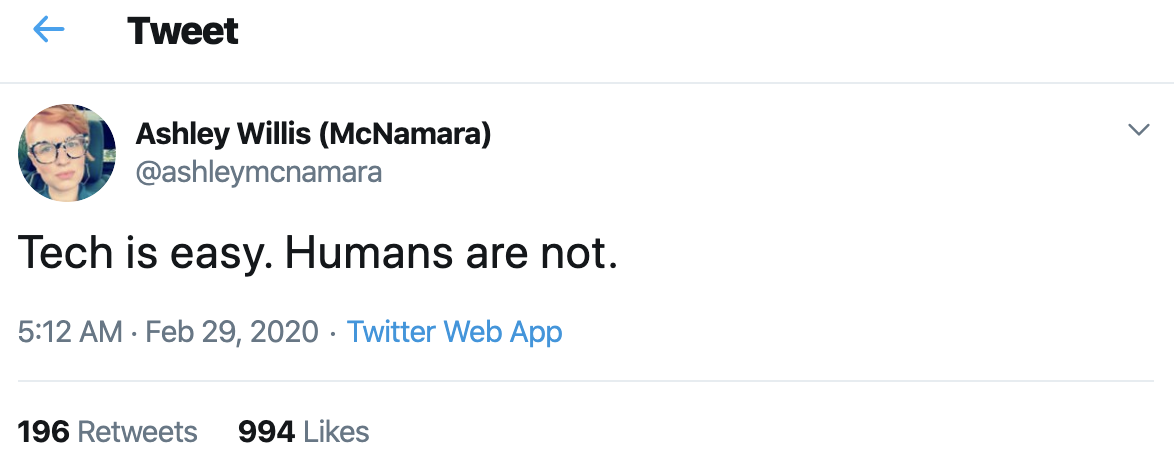What a psychologically safe environment means to me
No tech here
I follow Ashley Willis (McNamara) on Twitter. She knows her shit (and she’s awesome!). Ashley is incredibly influential in the tech space, and is a person that I genuinely admire. Dropping nuggets of gold wherever she goes, she recently tweeted this:

This is on point, and it resonates with me. Over the course of my career as a charlatan..ehh..I mean software professional, I’ve learned this to be true. When I started out in the software biz it was all about the tech. The tech seemed hard, and solving gnarly engineering problems was my jam. In reality though, that stuff is trivial when compared to dealing with humans and all the wonderful and zany problems we bring to the workplace. Now that I’m at the age where I tie onions to my belt, not a day goes by where I’m not in some sort of conversation about a person that needs help; whether that’s gentle coaching, direct support, or important immediate feedback. It’s part of the gig as a leader, whether I like it or not.
Reading Ashley’s tweet finally gave me the motivation to pull my finger out, and publish this post that has been sitting in the drafts folder for a few months gathering dust. My snotty little kids have been sick a lot recently, which has kept me sidelined. It’s not even winter yet! Honestly, with the amount of time I’ve had to take off work recently to care for them, it’s a bloody miracle I still have a job. But, how can I stay mad at a face like this?

Okay, back to the point. Stay focused here Graham! This post is really about the things I see as important when trying to build a psychologically safe environment for people. Achieving this is far from easy though. I assure you folks. However, as hard as it may be, if you can provide your people with an environment of trust and cohesiveness then everyone involved will be infinitely better off.
- they’ll be happier.
- they’ll be more innovative
- they’ll be less stressed.
- they’ll be more collaborative.
- and they’ll be more productive to boot!
Food for thought
Below you’ll find a list of ingredients that I believe can help build a psychologically safe environment. It’s not prescriptive, nor am I saying you have to agree with any of them! They are simply my guidelines and principles that I use when trying to lead people and teams. By sharing them, I hope they can be useful to others. If they’re not, that’s fine. I won’t be hurt.
-
Embrace and nurture juniors. They bring lots of energy and diversity. They can also teach new things to the more experienced team members. It works both ways y’all.
-
Always be coaching. Never give up on someone unless you’ve reached a point where you are absolutely sure that there’s nothing more you can do to help. Don’t forget that you’re dealing with human beings. Practice empathy, compassion, and patience.
-
“Praise in public, criticize in private” - Vince Lombardi. This is good advice indeed.
-
Welcome mistakes, and don’t scold people for making them. It’s how we learn. Obviously, if the same mistake is being made repeatedly, then you’ve got a problem that you need to deal with. While you’re at it, embed a blameless culture too i.e. no finger pointing, or witch hunts.
-
Establish a culture of listening and letting people finish speaking. Don’t interrupt. Listen. Don’t be the person who says ”well, actually it’s..” every chance they get.
-
Never ridicule a person for not knowing something, or for asking a question that may seem obvious to you or other team members. If you do this, you’re an asshole. You’re also not fit to be a leader. It’s that simple.
-
Constantly reinforce the message in the team that it’s ok to say “I don’t know”. When you witness people in a team confidently saying ”I don’t know, but I’ll find out”, that’s a team with trust. If there is trust then people will feel more empowered to take risks and innovate.
-
Accept that imposter syndrome is a real thing, and that everyone suffers from it. E.V.E.R.Y.O.N.E. Help and support those who suffer from it at an extreme level. They are the vulnerable ones who need the most attention.
-
Support a culture of elevating and helping others succeed. Not everyone will naturally do this. You need to show them the way and set the example.
-
Weed out the toxic people, even if they are the best devs/engineers you have (a.k.a 10x engineers). The team will be infinitely better off without them in the long run. See http://10x.engineer/ and http://1x.engineer/ for more info.
-
Make sure the team has fun. If people don’t enjoy work, they’ll quit. Celebrate even the smallest of wins. Recognise people’s good work and make a habit of calling it out.
-
Trust people to do the right thing. If there’s no trust in the team, then the team will eventually break down and output will suffer significantly. You’ll have a lot more unhappy people too. Suffice to say, you don’t want this.
-
I’m a firm believer in hiring for attitude and training for skill. If you follow this hiring philosophy, then I promise that you’ll end up with good people and balanced teams with high productivity.
-
Encourage people to challenge the status quo and to think differently. The people who do this are the best ones you have, not the troublemakers.
-
Don’t listen to Graham Polley. He doesn’t know what he’s talking about.